Historic centre of Nizhny Novgorod
The historic centre of Nizhny Novgorod (also old Nizhny Novgorod, the old town) is the downtown of Nizhny Novgorod with historical buildings in the borders up to 1917.[1] A large number of ancient buildings, natural landmarks and historic districts are found in the area. In the old city there are buildings of different epochs and architectural styles, including Neo-Byzantine, Stroganov's Baroque, Empire, Modern. These include the medieval Kremlin, 19th-century mansions and Stalinist monumental houses.
Historic centre of Nizhny Novgorod Исторический центр Нижнего Новгорода | |
|---|---|
Reservation | |
_%D0%B2_%D0%9D%D0%B8%D0%B6%D0%BD%D0%B5%D0%BC_%D0%9D%D0%BE%D0%B2%D0%B3%D0%BE%D1%80%D0%BE%D0%B4%D0%B5..jpg) Lower Posad and the Kremlin | |
| Nickname(s): Old city | |
| Coordinates: 56°19′6″N 43°59′40″E | |
| Country | Russia |
| City | Nizhny Novgorod |
| Division | Upper City |
Sites
The site contains the following objects
- Historic centre of Nizhny Novgorod (downtown);
- The Kremlin;
- Upper Posad;
- Lower Posad;
- Zapochainye;
- Dyatlov Hills;
- Historic centre of Kanavino (midtown);
- The Fair;
- The Spit (Strelka);
- Moskovsky railway station and Revolution Square;
- Historic centre of Sormovo;
- The Sormovo Factory.
Location
The old city is located on two hills: Kremlevsky and Ilyinsky. On the Kremlevsky hill is the Kremlin itself and the historical districts around it: the Upper and Lower Posads, the Rozhdestvenskaya Side, a complex of historical streets (for example: Bolshaya Pokrovskaya and the Varvarskaya), the Pechersky Monastery, and Pochayna River. On the Ilyinsky hill there is the territory of Zapochainye, starting from Ilinskaya street and ending with the Lyadov Square.[1]
The old Kanavino with the Fairground and the old Sormovo are considered part of the old town, despite the fact that these settlements were included in the city after 1917. The old Kanavino includes the territory of the Fair, the Spit and the Gordeevka. There are many landmarks in this territory: the Fair and the Main Fair Building, the Moskovsky railway station with the adjacent square and the Central Department Store, the Smolensk-Vladimir Church in Gordeevka[2] and the Gordeevsky department store, as well as many 19th-century mansions. On the eve of the World Cup in 2018, the territory of the old Kanavino underwent major reconstruction.[3][4]
Old Sormovo is more remote from the historical centre. In the centre of this territory, Stalinist style buildings predominate but there are a few pre-revolutionary buildings: the Transfiguration Cathedral, Barricade School, Krasnoye Sormovo Factory and some 19th-century mansions. At the beginning of the 20th century, Sormovo was the centre of revolutionary battles in 1905,[5] because of this, many revolutionary monuments are located on this territory.
Gallery
 The Kremlin
The Kremlin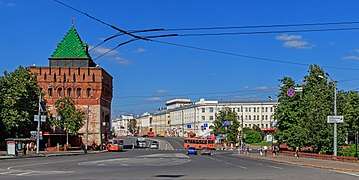 Minin Square (Upper Posad)
Minin Square (Upper Posad) National Unity Square (Lower Posad)
National Unity Square (Lower Posad)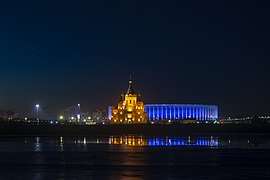 The Spit (Strelka)
The Spit (Strelka)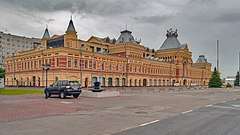 The Fair
The Fair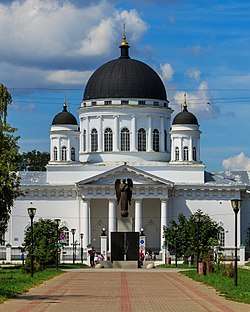 The Transfiguration Cathedral
The Transfiguration Cathedral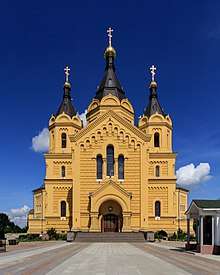
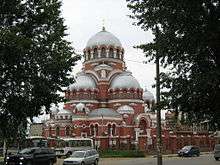 Sormovo Transfiguration Cathedral
Sormovo Transfiguration Cathedral
References
- "Карта "Историческая территория "Старый Нижний Новгород"»". Открытый текст (in Russian). opentextnn.ru. Retrieved 16 February 2018.
- "Нижегородская Митрополия". Сайт Нижегородской Митрополии. Retrieved 16 February 2018.
- "Новое "Старое Канавино"". Открытый Нижний (in Russian). opennov.ru. 4 September 2018. Archived from the original on 5 July 2018. Retrieved 16 February 2018.
- Мария Медвидь (1 October 2015). "Новое Старое Канавино | Медиапроект "Столица Нижний"". Столица Нижний (in Russian). stnmedia.ru. Retrieved 16 February 2018.
- "Революция в Н. Новгороде: рабочий поселок Сормово Нижегородской губернии в 1905 г." NN-Stories. Archived from the original on 16 February 2018. Retrieved 16 February 2018.